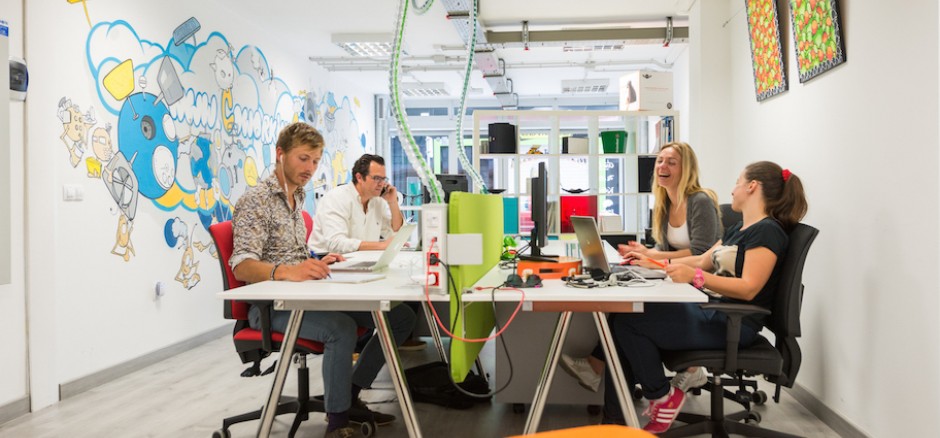It’s no surprise that there are now several active coworking spaces in the Canary Islands. The combination of scenic beauty and the relaxed and warm local culture is not only perfect for a vacation but attracts more and more digital nomads and freelance professionals. One of the most international spaces is CoworkingC, based in Las Palmas. The small yet vibrant space aims to build an international community while also changing work culture in the region.
CEO and local, Nacho Rodriguez is working to create positive change in the community via CoworkingC as well as strengthening the position of the Canary Islands as an international hotspot.
Hi, Nacho. Can you please tell us a bit about your history with coworking and also about CWC’s history?
CoworkingC started two years ago, first as an office space to host a spin-off of the IT department from one of our companies. Eventually, it turned out to become an international workspace, which currently hosts local entrepreneurs and digital nomads that are working remotely from Las Palmas. We pivoted heavily during the process and keep learning and trying to improve every day.
You are very involved in the coworking community. As the moment has developed substantially over the years, what observations have you made?
In my opinion, the coworking market is starting to mature. After some years of substantial growth, it is now starting to become more sustainable and at the same time it keeps growing. It’s remarkable, the fact that some administrations start regulating their public offer in order to avoid unfair competition with the private sector, which has been a problem in the past.
What are some of the most exciting and novel directions you see coworking moving?
I am very enthusiastic about all the transcendent changes that go along with the coworking movement. Remote Work, Distributed companies, Coliving, and Digital Nomads are all changing the way we understand work, collaboration, and human interaction.
From these observations do you see coworking as a viable option for the standard office space, or do you think it’s better to have coworking remain as an alternative option, in order to preserve more community-oriented models?
In my opinion, coworking must be part of the DNA of a company or business. But, I don’t see this work philosophy in many sectors just yet. While it is rapidly evolving as more and more people realize the benefits of coworking, some sectors will most likely remain traditional.
We all know the Canary Islands are beautiful and are also rapidly attracting digital nomads. What percentage of your community is comprised of nomadic workers?
70% of our community are digtal nomads that arrive attracted by the weather and beauty of the Canary Islands. They also decide to stay longer when they realize that we have much more to offer than just the beach and sunshine.
How do you accommodate their needs and help them integrate?
The official language at CWC is English, although we encourage our visitors to learn Spanish, which helps long-term visitors to fully integrate with that local community.

Nacho Rodriguez
We also recently activated a coliving center to help facilitate our visitors integrate, and also help in finding them affordable housing in an efficient and flexible way. We also organize Meetups and events to accelerate the generation of value within our community.
What impact does a more internationalized community have on the locals, and is coworking responsible for this international wave?
Our market is fairly small, and opportunities for locals scarce. Having an international community allows locals to have a broader perspective on the global market and also gives them the chance to access new opportunities, while also helping them to improve their English skills.
Currently, some of our local members are working abroad with other international coworkers, taking advantage of the Erasmus+ programs and enjoying a great personal experience.
You describe your space as intimate and personal.
Intimacy allows us to cover the personal needs of our visitors, offering a much better value proposition than bigger networks. As long as we manage to provide effective networking and opportunities to our members, we believe we provide a better service than larger spaces .
Our maximum capacity is 25 people. We believe that there are many advantages of having a small space. Although we do understand that smaller in size makes is more difficult to become profitable. Currently, we are planning to expand, not in size, but rather in the number of spaces across the Canary Islands. We are also thinking to expand internationally as well.



0 Comments